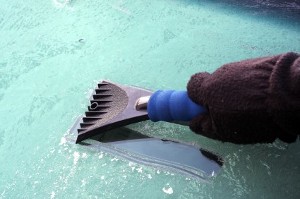It’s that time of year again, the holidays are approaching and so are the cooler temperatures. We don’t always have time in our busy holiday schedules to deal with minor inconveniences caused by winter weather. So here are some suggestions for winterizing a car using household items that most of us have in our pantry. 
Michael Calkins, manager of AAA’s Approved Auto Repair program recommends using petroleum jelly on the battery terminal caps to stop battery corrosion. Simply remove the terminal caps and clean any existing corrosion with a wire brush, then coat the terminals with petroleum jelly. The jelly forms an airtight seal that wards off salt, slush, and mud, which causes corrosion on the battery terminals.
If you are going to store a car rather than winterize and drive it, there is a possibility of rodents building nests in your engine. To discourage the little pests from nibbling on wires and making a home in your engine, tape a peppermint tea bag to the engine, away from moving parts. The minty scent will repel rodents and keep them away through the winter.
Winter driving here in Colorado means snow one day, slush and mud the next. This plays havoc on our cars as well as our headlights. To keep your headlights doing their job, clean them and then apply a nonabrasive car wax with a soft cloth. The wax is water-repellent and leaves a barrier that keeps dirt from building up. It’s recommended to do this once a month.
Have you ever gone out to start your car in the morning and not be able to open the door because it’s frozen shut? There is a simple winterizing trick for this. Coat the rubber door seals with cooking-oil spray. It repels the water that would otherwise collect on the rubber seals and freeze, causing the doors to freeze shut.
Another problem we have in the winter is the frost accumulating on the inside of our windows, obstructing our view and increasing our chances of having an accident. To prevent this, dissolve 2 tsp. of salt in a gallon of water and wipe the insides of the windows and windshield with this mixture. As the mixture dries, it leaves an invisible layer of salt–which has a low freezing temperature, and will help keep frost from forming on the windows for a month or more! Please don’t use this mixture on the outside of the car because the salt could cause corrosion to the exposed metal.
So before you go out shopping or drive to that holiday party, winterize your car with these common items and see if your life seems a little bit easier! I’m going to try them out right now!

Leave a Reply
You must be logged in to post a comment.